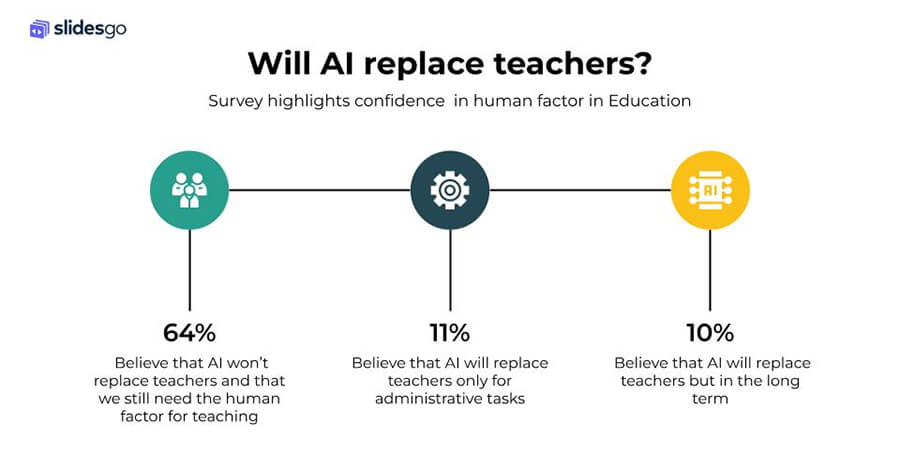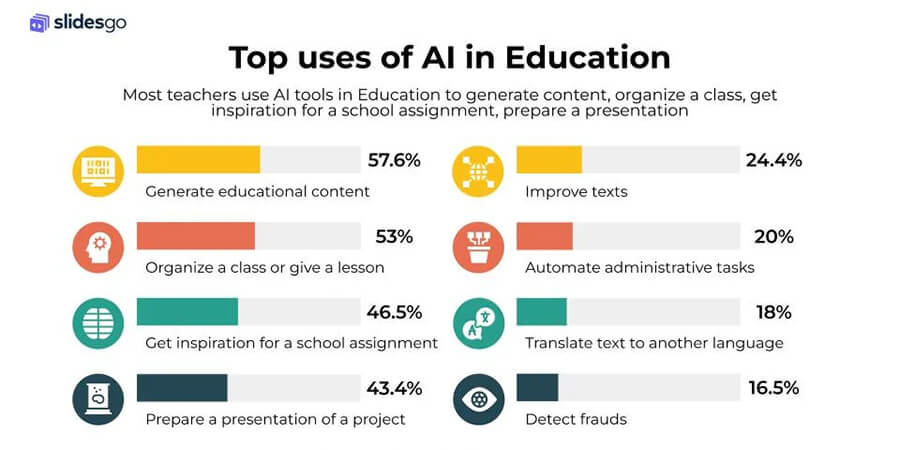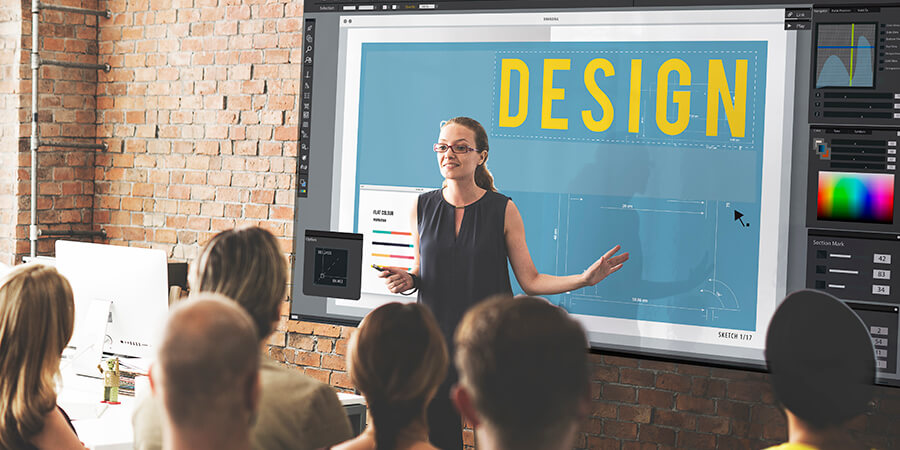The Future of Education with
AI Tools and New Technologies
See also: Assessing Internet Information
The world is changing very rapidly thanks to the speed of technological innovations and globalization. This is drastically changing the workforce and reshaping the skills needed to succeed in today's job market.
Of course, this is also the culprit behind a growing mismatch between what's currently being taught in our education systems and the skills that future workforces need. This calls for a much-needed shift in our educational system: the learning content and the learning experiences we provide students and, ultimately, the role teachers play in the classrooms need to keep up with the changes.
This article explores the future of education and the essential skills that learners and teachers need to acquire to prepare them to be future shapers of society.
Will AI Replace Teachers?
As every industry rapidly embraces digital transformation, new technologies render certain jobs obsolete, leading to layoffs. This has led to a rising fear among workers of being replaced by AI. Teachers are not exempt; many feel uneasy about AI taking over their jobs, highlighting the uncertainty surrounding the future of education.
Despite this, Slidesgo's AI in Education survey revealed that 64% of teachers believe AI won't replace the human factor in teaching. Educators are reassured of the irreplaceable value of unique qualities and personal interaction human educators bring to the learning process. We’re talking about empathy, coaching, mentoring, creativity, and a nuanced understanding of each student's unique needs, qualities AI technologies can’t replicate yet.

Source: Will AI replace teachers?
4 Teaching Skills to Thrive in Education
Teachers, major players in shaping education's future, play a significant role in equipping students with the skills and mindsets they need to thrive in a rapidly changing work environment. Their role extends beyond merely honing their teaching skills for professional development; it's about the burden of developing learners ready for the future.
Here, we explore key teaching skills educators need to cultivate, keeping the future of education at the forefront of their instructional strategies.
Innovation skills
Innovation is critical in shaping the future of education, making it a crucial element in the classroom. Innovative teachers embrace the shift from traditional lecture-based approaches to more interactive, facilitative methods. Adopting project- and problem-based content delivery makes learning more practical and relevant, equipping students to face real-world challenges more effectively.
Rather than just conveyors of information and relying on mere memorization, they act as guides to facilitate active learning through ideation and iteration. They prioritize developing critical thinking, problem-solving, and system analysis skills in students -- key competencies for the future job market.
They use trial and error and collaborative learning to foster an atmosphere where students confidently explore new solutions and ideas, a crucial element expected in the future of education.
Interpersonal skills
Education involves the whole child. That being said, we need teachers with a blend of academic expertise and interpersonal skills to prepare learners for the challenges of the future of education and the future workplace.
It takes educators with strong interpersonal skills to nurture students' social and emotional growth. They know how to communicate, show genuine empathy, and deeply understand their students' diverse backgrounds and needs. Because of these skills, they can better manage classroom dynamics and build trusting connections with students.
Flexibility and adaptability
It takes open-minded teachers to try different methods and materials to create a more inclusive and responsive learning environment. Instead of a one-size-fits-all approach, they offer personalized instruction that acknowledges each student's learning style and pace. Teachers understand that learners cannot be boxed; in turn, they tailor their teaching styles to the unique needs of every student and trust that their students know how they learn best.
Creativity
We need creative teachers to build better learning experiences for students. We need creative teachers to create a learning environment to help learners adopt an out-of-the-box mindset, letting them see problems from different angles and find innovative solutions.
Teachers should be ready to delve into digital technology, including games, art, and animations, to make learning more contextualized and engaging. Doing so will not only enliven lessons but also help learners learn to be creative, a vital component in the future of education.
How AI Is Transforming Education
AI is already transforming the future of education. But instead of being perceived as an enemy, teachers use these AI-powered teaching tools to help automate administrative tasks and free their hands for more meaningful work.
AI-powered apps and platforms enable educators to develop personalized learning experiences, produce targeted feedback and recommendations, address specific skills, and create a more interactive and engaging learning environment.
Forward-thinking teachers also tap teaching tools like AI text generators to generate educational content. Survey results from Slidesgo about the uses of AI in Education showed that nearly half (46.5%) use such tools to plan lessons and find inspiration when preparing assignments and projects for their students.
Here are other key findings to consider:
70.7% of educators believe that AI tools aren't just a technological luxury but a necessity in improving the educational experience.
61.5% of teachers have actively used generative AI tools in the last three months.
71% of teachers agreed that AI is actively improving the quality of their daily work.
A whopping 73.5% of teachers said that AI drastically reduces their time on administrative tasks, making teaching more focused and productive.

Source: Top Uses of AI in Education
We can see how AI tools are turning into a teacher’s ally; they help streamline the planning process and remove the heavy burden of planning and organizing for their lessons. Instead of seeing it as a threat, many see it as a tool they can use in the future of education. They see it as a tool to meet learners where they are, create learning experiences tailored to individual needs, and provide educational experiences that reflect the future of work.
Conclusion
The swift pace of technological progress is transforming the workplace, demanding significant changes in educational systems for the future of education. Central to this change, teachers need to adapt and improve their teaching strategies to prepare students for the ever-evolving job market.
As AI increasingly becomes a part of the educational landscape, AI technology in education emerges as a valuable ally, not a substitute or a threat. Combining the unique strengths of human educators with technological innovations sets the pace to propel an educational system that is more aligned with the future of work.
About the Author
Rachel Melegrito, a former educator, has transitioned into a full-fledged writer, channeling her passion for teaching into her writing, covering topics in health, technology, home, and business.

